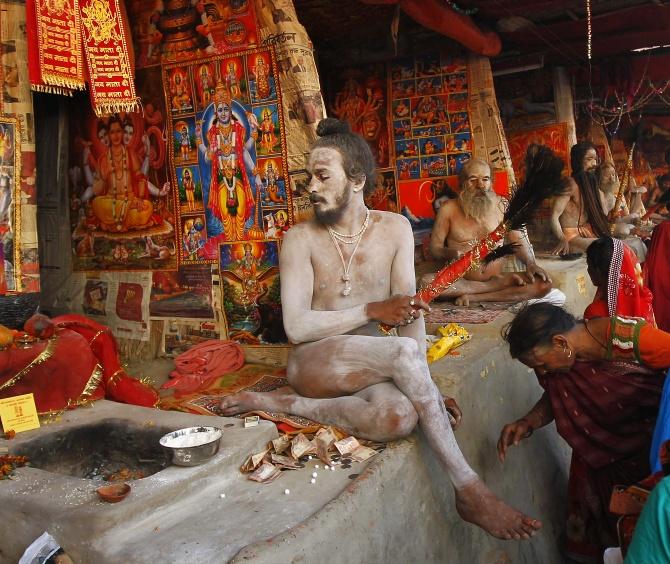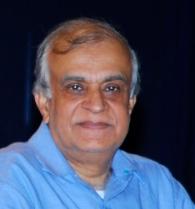
A Hindu woman seeks a Naga sadhu’s blessings in Kolkata.
Arthur J Pais
‘In theory, yes, Hindus are very open. I’m one of them. I’ve coined the phrase ‘open architecture’.’
‘But I think the Wendy Doniger group is not allowing open architecture. They are closing this architecture.’
‘They are bringing a point of view in such a heavy-handed way that it tends to dominate and it tends to suppress the alternative points of view. So some kind of counteraction is necessary and using the law is a decent thing to do.’
 Rajiv Malhotra, one of Wendy Doniger’s most vociferous critics, speaks to Rediff.com’s Arthur J Pais about the prejudices created by American scholars about Hindu gods and Hinduism.
Rajiv Malhotra, one of Wendy Doniger’s most vociferous critics, speaks to Rediff.com’s Arthur J Pais about the prejudices created by American scholars about Hindu gods and Hinduism.
Rajiv Malhotra, left, a constant critic of Wendy Doniger and what he calls her Chicago school of writers and thinkers, retired at age 44 some 20 years ago and put his money into the Infinity Foundation, an one-man think-tank.
The Indian-American writer of books on India has devoted himself, for more than a decade-and-a- half, he says, to “clarifying the many misperceptions about Indic traditions in America and among Indians.”
When did the fight against the book start? How did it go through?
My involvement with this started in the year 2000. My kids went to Princeton Day School and one day the teacher asked me for information on Vedanta, (Swami) Vivekananda and Ramakrishna (Paramhamsa) because in their teaching of world religions they wanted to have knowledge of Hinduism.
One of the teachers told me that he has been advised by some American scholar not to teach Vivekananda and Ramakrishna because the parents would object to this. When I asked why the parents would object, he said it has been declared that Ramakrishna had a relationship with Vivekananda.
I have never heard of such a thing. We started investigating this and asked which scholar had said this and that is how I discovered a whole genre of scholarship which has this kind of view that Wendy Doniger and her students came up with. So, they used Freudian psychoanalysis to psychoanalyse (Hinduism).
Which book has talked about Swami Vivekananda and Ramakrishna Paramhamsa?
A book called Kali’s Child by Jeffrey J Kripal. Then I found Paul Courtright, one of Wendy’s students, had a similar book called Ganesa: Lord of Obstacles, Lord of Beginnings. They had this very vulgar kind of view.
So, I tried to take this around to the religious, Hindu community and they did not want to touch it. Many of the Hindu leaders in this country (America) maybe were too arrogant, too cocky, or too embarrassed or too scared to talk about it. They did not think it important to take any action.
So I took it upon myself to start writing articles expressing that these are not correct interpretations…
This issue has nothing to do with Christianity versus Hinduism, because most of these people are Jewish, anyway. They are using a Marxist lens, a Leftist lens, a Freudian lens. The kind of theories they are using are completely inapplicable to the Indian way of life.
Then, I started attending the conferences of religion to see why this is happening. It was very strange. All religions had people represented from within.
You would see rabbis from Judaism, Buddhist monks, imams talking about Islam. In the case of Hinduism, there was hardly any practising Hindu speaking for it. It was entirely non-Hindus who felt that they have understood the text, learnt Sanskrit and they were able to interpret it. So, I felt that this is a huge untold story.
I started writing articles. These articles created a huge stir. And, this is the situation with these people. We compiled these arguments in a book called Invading the Sacred that came out in 2007, and since then I have come out with three more books that are not on Wendy but other issues related to Indian civilisation and Indian philosophy and thought and so on.
I personally moved on beyond Wendy Doniger. But I have created a huge awareness and awakening among the Diaspora and among people in India. So many other groups started getting immersed and started taking up my cause and they are the ones who started litigating on Doniger and her book and so on in India.
There has been quite a bit of criticism against the group that filed the case against Doniger’s book.
The person who filed the case is a woman called Monika Arora. She is a very reputed Supreme Court lawyer in Delhi. She filed this case.
Some people are trying to portray the Hindus involved in this case as some kind of savages, violent people and all of that. The point is that the Hindus who filed this case used the rule of law; they used the courts. There is no hint of any violence. They are very cultured, sophisticated people. They went to the court and filed a case.
The case has been going on for over two years. There was never a hint of any violence or anything indecent. It was a let’s go to court and fight. So, the Hindu site put out a petition in the court citing many, many instances of errors in the book, citing page numbers. Some of these are not matters of interpretation, but factual errors and these are available online.
There is a petition that lists many, many pages of errors and so the opposing side of Penguin gave Wendy Doniger’s point-by-point response. This went back and forth several times.
It was not like it was an uncivilised mob. It was a very civilised legal due process going on.
I’m not privy to what was the thought process of the Penguin side. But they must have concluded that they have the risk of losing. So, they reached an out-of-court settlement to withdraw the book.
Now, somehow, the Western scholars are making it sound like some kind of a Hindu mob pushed them and forced them with violence. There is no evidence of such thing; on the contrary, the entire evidence is that it was a legal due process by which a civilised country manages disputes.





